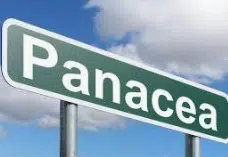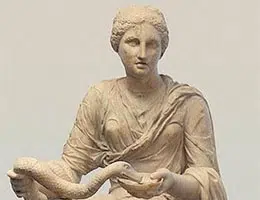 The Greek word panákeia came to Latin as panacēa , which in our language became panacea . The term can be used to refer to a medicine that is considered effective for the treatment of different diseases.
The Greek word panákeia came to Latin as panacēa , which in our language became panacea . The term can be used to refer to a medicine that is considered effective for the treatment of different diseases.
A panacea is also used to refer to a solution that can be applied to any kind of illness . In ancient times, alchemists sought to find a universal panacea : a substance capable of curing all illnesses .
For centuries, alchemists tried to find a medicine that could reverse any health problem. If the universal panacea was discovered, the alchemists believed, life could be extended indefinitely.
It is worth noting that in Greek mythology, Panacea was a minor goddess linked to health. Daughter of Epione (a mortal woman) and Asclepius (the god of medicine for the ancient Greeks), Panacea was credited with the property of a potion that healed the sick. This mythological issue explains the quest of alchemists and the use of the notion in the field of medicine .
As additional data, Panacea was the granddaughter of Apollo (the god of beauty) and sister of Hygieia (goddess of hygiene and cleanliness), Iasus (goddess of healing diseases), Aceso (goddess of the healing process itself) and Egle (goddess of healthy appearance).
Panacea also had four mortal brothers: Machaon (king of the city of Trikala, specialized in surgery), Podalirion (another king of Trikala, dedicated to medicine), Aratus (a hero responsible for the liberation of Sicyon) and Telesphorus (who spent his entire life serving his father). Machaon was killed by the queen of the Amazons, Penthesilea, in the Trojan War , in which he had participated with his brother Pondalirion.
 According to stories from Greek mythology, the goddess Panacea collaborated with her father in the development of medicines to treat the sick, especially using plants. Despite her status as a "minor goddess," Panacea was one of those invoked in the Hippocratic Oath until it was modified at the Geneva Convention (from the 5th century BC until 1948). It is important to note that in this change all references to the Greek gods were removed.
According to stories from Greek mythology, the goddess Panacea collaborated with her father in the development of medicines to treat the sick, especially using plants. Despite her status as a "minor goddess," Panacea was one of those invoked in the Hippocratic Oath until it was modified at the Geneva Convention (from the 5th century BC until 1948). It is important to note that in this change all references to the Greek gods were removed.
In the etymology of the name Panacea, which derives from the Greek Panákeia , we find the components pan , which can be translated as "all", and akos , which means "remedy".
In colloquial language , a panacea is something that solves everything. The concept is often used to exaggerate the benefits of something . For example: “This phone is the panacea! I use it as an agenda, an alarm, a computer and a TV” , “The hiring of the Uruguayan coach was the panacea for the team: the technical director ended the internal conflicts and managed to get all the players to perform to the maximum of their potential” , “Many politicians want to convince us that cutting state spending is the panacea, but I don’t think that’s true: we need a strong State to assist vulnerable sectors, control companies and protect citizens’ rights” .
The term “search for a panacea” is also used in everyday speech, and may well appear as an expression. Just like alchemists, all human beings tend to pursue a harmonious life, without problems and with as many comforts as possible within our reach. Since we live immersed in a series of political and economic structures, we believe that we can find these absolute recipes in government measures, in commercial products and services.
